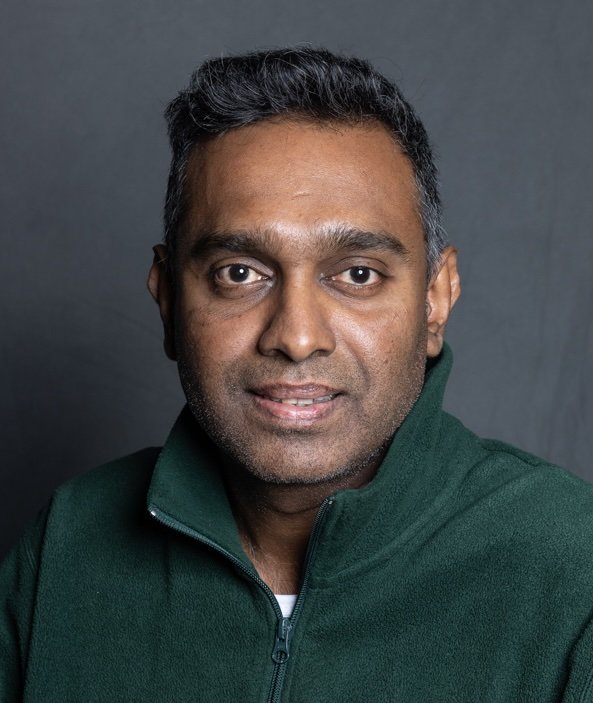 アサンカ・パレゲダラ
アサンカ・パレゲダラ
スリランカ・ウェヤンバ大学
経済学教授
Policy Analysis Program (2011年修了)
Please tell us about your career path so far. What is your area of specialization and how did you come to work in this field?
I studied engineering as an undergraduate before moving to economics at the postgraduate level. After completing my high school Advanced Level (AL) studies in Sri Lanka, I came to Japan in 2001, as a Japanese government Monbukagakusho scholarship holder. After one year of Japanese language training for at the Tokyo Japanese Language Education Center, I completed my associate degree in Information Engineering at the National Institute of Technology (KOSEN), Kushiro College in Kushiro, Hokkaido, Japan. I then completed my Bachelor's degree in Engineering at the University of Electro-Communications, Tokyo.
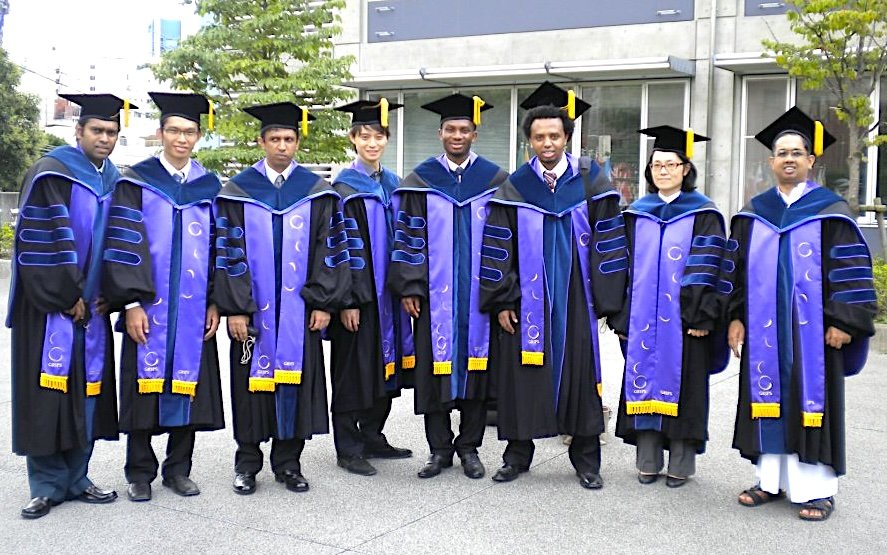
With fellow students on graduation day at GRIPS, September 2011
Before enrolling at GRIPS in 2008, I briefly worked at Fujitsu Limited as a systems engineer. After completing my PhD in Development Economics under the guidance of Professor Yamano Takashi at GRIPS, I returned to Sri Lanka in 2011and began my academic career as a lecturer at Wayamba University of Sri Lanka. Since then, I have been promoted to Senior Lecturer and then to professor in Economics in 2022.
The Wayamba University of Sri Lanka is a one of the Sri Lankan state universities which offers both undergraduate and post-graduate degrees. I am attached to the Department of Industrial Management in the Faculty of Applied Sciences, where I primarily and teach subjects related to economics and econometrics. In addition to teaching, I conduct research activities, especially analyzing issues related health economics, economics of education and environmental economics in developing countries. I am also actively engaged in university administration, serving as Director of the Center for Quality Assurance and as Coordinator of External Affairs.
Have you always wanted to pursue a career in academia? What attracts you most about it, and what keeps you inspired?
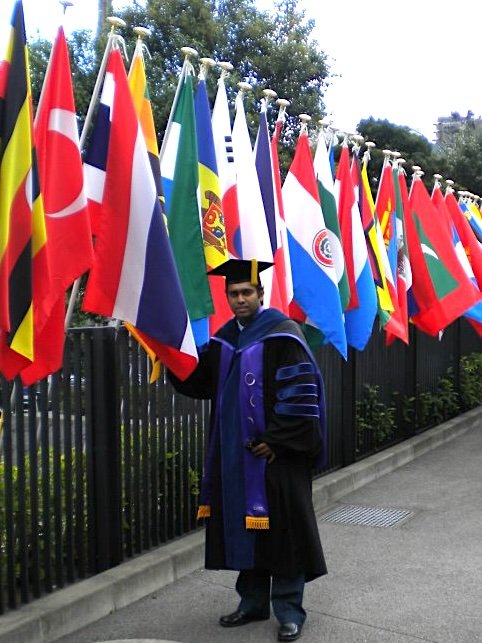
Graduation from GRIPS, September 2011
Yes, I think I always wanted to pursue a career in academic setting because I like both teaching and reading books. I also like conducting research in different fields and sharing my knowledge with a wider community. I think this combination of teaching, learning, and research has inspired me to pursue a career in academia.
You are currently working as a Professor in Economics at Wayamba University of Sri Lanka. What are your current research interests and what got you interested?
I am primarily interested in doing research in development economics. My work focuses on the economic analysis of health care, education, environmental, and industrial issues in Sri Lanka and other developing countries. I especially enjoy conducting field research using survey data, as well as experimental evaluations through randomized control trials and quasi-experimental research methods. Much of my research centers on impact assessments and identifying areas for future improvement.
You were also recently selected as a Research Ambassador for the Deutscher Akademischer Austauschdienst (DAAD) - the German Academic Exchange Service. How did this appointment come about, and what does the ambassadorship involve?
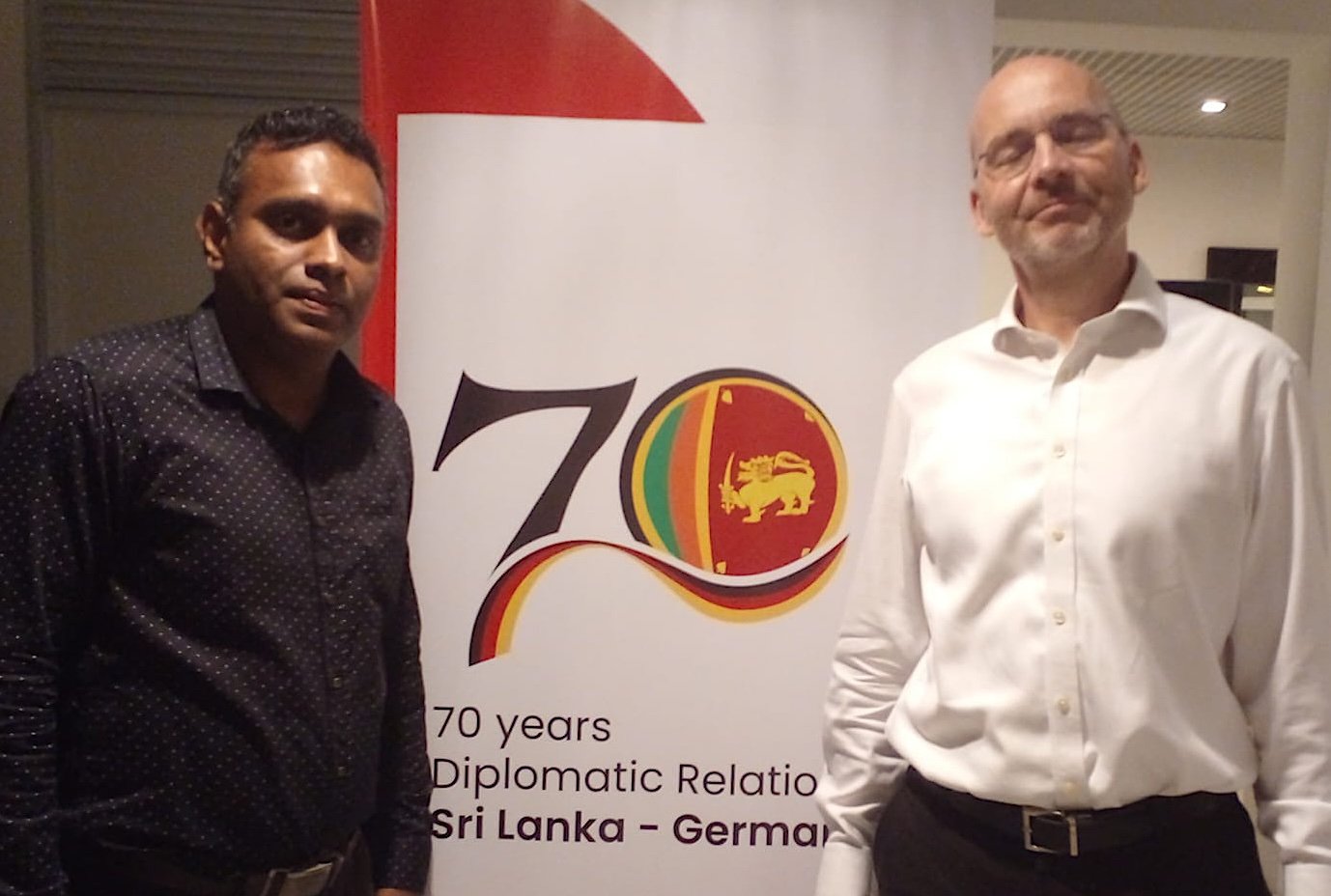
Asankha with German Ambassador to Sri Lanka in 2023
I received the Alexander von Humboldt Foundation's Georg Forster Research Fellowship to conduct postdoctoral research in Germany from 2016 to 2018. During this time, I carried out my research at the University of Passau under the supervision of Professor Michael Grimm. After returning to Sri Lanka, I became actively involved in activities related to academic and scientific cooperation with Germany. I participated in several alumni programs organized by the German Academic Exchange Service (DAAD), and was recently selected as an honorary DAAD Research Ambassador.
DAAD Research Ambassadors work as partners in promoting academic and scientific education and research. They act as a think-tank and serve as a first point of contact for initiating academic cooperation and projects, and for planning and supporting delegation visits from Germany. In addition, they act as role models by informing and inspiring the next generation of students and scholars.
What have been the most interesting or rewarding aspects of your career thus far?
I believe that sharing knowledge with younger generations is the most interesting and rewarding aspect of my career as a university professor. In addition, the opportunity to pursue research based on my own interests and to collaborate with both local and international researchers has been especially fulfilling. These are the aspects of my academic career that I find most rewarding.
Looking ahead, what are your professional goals, and where do you envision your work and contributions in the next five to ten years?
I hope to continue my research on innovative and policy-relevant topics related to developing countries. My goal is to generate valuable evidence that can support informed decision-making. I also aspire to share my findings with a wider audience--not only within academia, but also with policymakers and the general public. In addition, I wish to mentor younger lecturers and researchers by sharing insights from my experience working in different country contexts.
What led you to GRIPS? What is the most important thing you gained from it, and how has your experience at GRIPS prepared you for future endeavors?
While working as a systems engineer at Fujitsu Limited, I began searching for postgraduate opportunities and came across the newly established Policy Analysis program at GRIPS. I was very impressed by the program's content and decided to apply. Fortunately, I was accepted, and this marked the beginning of my transition from engineering to economics--a field very different from my undergraduate studies.
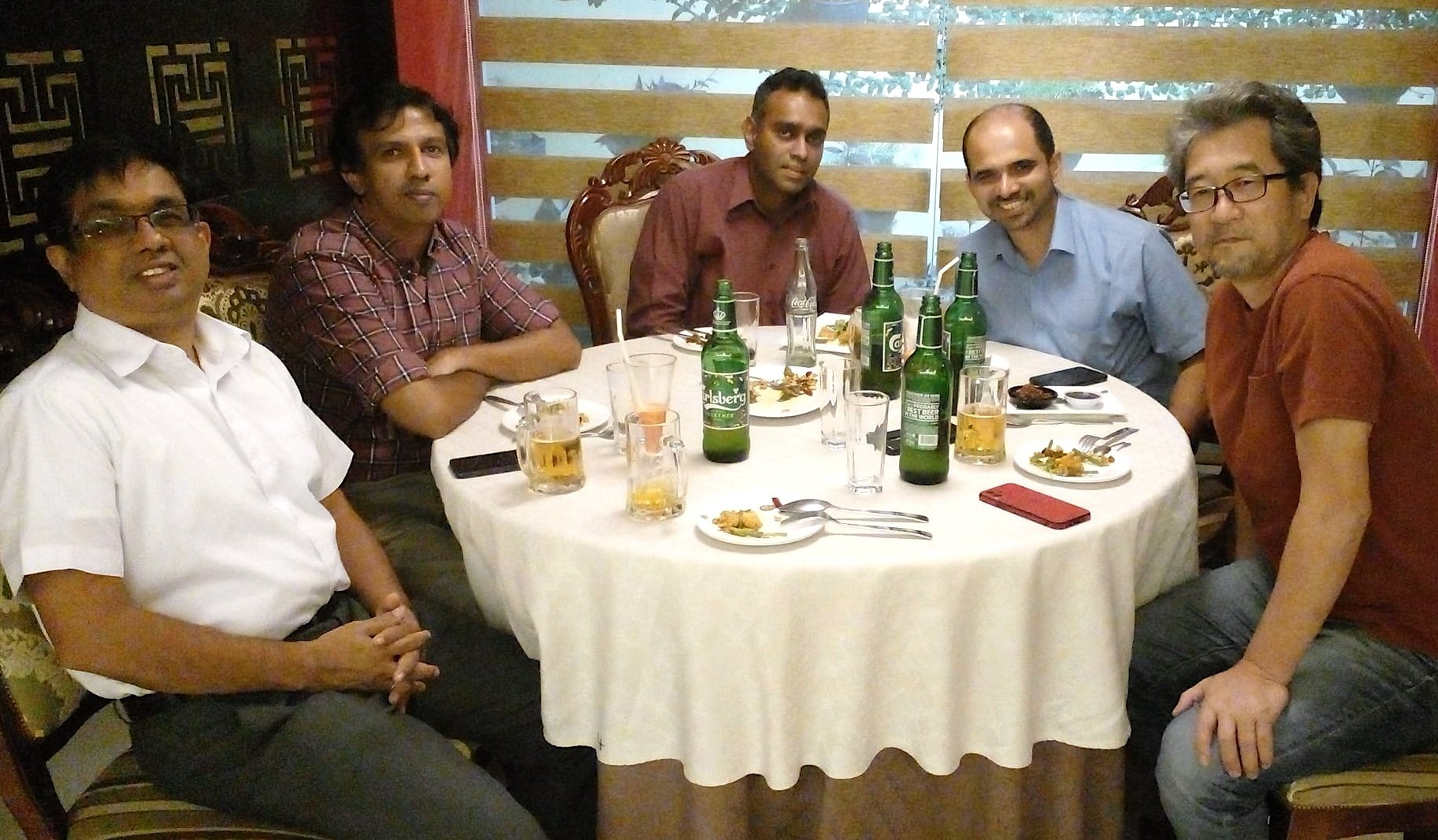
With Prof. Yamano and fellow GRIPS alumni in Sri Lanka, 2022
At GRIPS, I discovered a strong interest in economics, especially development economics. I studied both theoretical and empirical subjects and conducted research under the guidance of Professor Takashi Yamano and Professor Roberto Gonzales. GRIPS played a pivotal role in shaping my decision to focus on development issues related to health care, education, and the environment in developing countries.
Have you had any involvement, professional or otherwise, with Japan since your graduation?
Yes. Although I have not traveled to Japan since my return, I have regularly attended GRIPS alumni meetings held in Colombo, Sri Lanka, often with the participation of Professor Nobuhiro Hosoe. In addition, I have stayed in contact with several current and former GRIPS professors.
How do you balance your demanding professional responsibilities with personal life, and what do you enjoy doing outside of work?
Despite the busy schedule of my academic work, I make it a priority to maintain a healthy balance between my professional and personal life. Since the role of a university professor is not a typical 9-to-5 job, I make sure to set aside time for my family. Outside of work, I enjoy watching television and playing basketball and cricket with my children.
What are some of your fondest memories of your time spent at GRIPS? And what do you miss about Japan?
My fondest memories at GRIPS are the interactions I had with friends from many different countries around the world. I also fondly remember the crowded trains I used to take between GRIPS and my apartment. What I miss most about Japan, however, is the food--especially dishes like unagi-don and oyako-don, which are hard to find in Sri Lanka.
If you could give one piece of advice to anyone considering studying at GRIPS, what would it be?
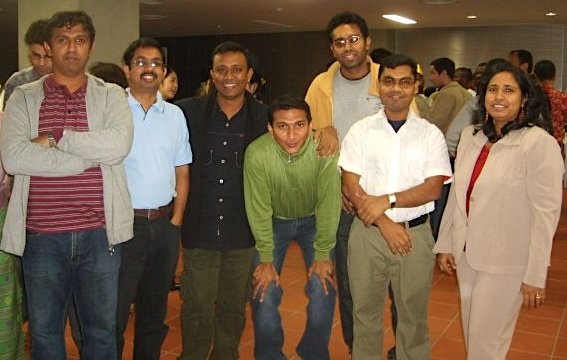
With fellow students from Sri Lanka at the GRIPS welcome party, October 2008
As an alumni of GRIPS, I can say that GRIPS is a unique university in Japan for postgraduate studies. It is a truly international university where most students and faculty come from outside Japan, giving you the chance to interact with diverse cultural and professional perspectives. The curriculum is continually updated to equip future policymakers with the skills they need to become future policy leaders. For anyone passionate about social science research and global issues, GRIPS offers an unparalleled opportunity to grow academically and personally.
How would you like to stay connected with GRIPS as an alumnus? Do you have any suggestions for strengthening the GRIPS alumni network or making it more impactful?
I stay connected with GRIPS by keeping in touch with the professors who taught me and by actively participating in both online and in-person alumni events organized by GRIPS. The GRIPS Alumni Association is an excellent platform to share knowledge and experiences. To make the network even more impactful, I would suggest organizing regular regional alumni meetups and offering training or professional development programs specifically for alumni. These initiatives could strengthen connections and provide ongoing learning opportunities for the GRIPS community.






